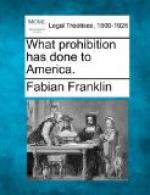Nor is the case essentially different as regards the West; the very people who are loudest in their shouting for the Eighteenth Amendment are also most emphatic in their praises of what Kansas accomplished by enforcing her own Prohibition law. Thus the Prohibitionist tyranny is in no small measure a sectional tyranny, which is of course an aggravated form of majority tyranny. But what needs insisting on even more than this is the way in which the country districts impose their notions about Prohibition upon the people of the cities, and especially of the great cities. When attention is called to the wholesale disregard of the law, contempt for the law, and hostility to the law which is so manifest in the big cities, the champions of Prohibition in the press—including the New York press—never tire of saying that it is only in New York and a few other great cities that this state of things exists. But everybody knows that the condition exists not only in “a few,” but in practically all, of our big cities; and for that matter that it exists in a large proportion of all the cities of the country, big and little. But if we confine ourselves only to the 34 cities having a population of 200,000 or more, we have here an aggregate population of almost exactly 25,000,000—nearly one-fourth of the entire population of the country. Is it a trifling matter that these great communities, this vast population of large-city dwellers, should have their mode of life controlled by a majority rolled up by the vote of people whose conditions, whose advantages and disadvantages, whose opportunities and mode of life, and consequently whose desires and needs, are of a wholly different nature? Could the tyranny of the majority take a more obnoxious form than that of sparse rural populations, scattered over the whole area of the country from Maine to Texas and from Georgia to Oregon, deciding for the crowded millions of New York and Chicago that they shall or shall not be permitted to drink a glass of beer? Nor is it only the obvious tyranny of such a regime that makes it so unjustifiable. There are some special features




